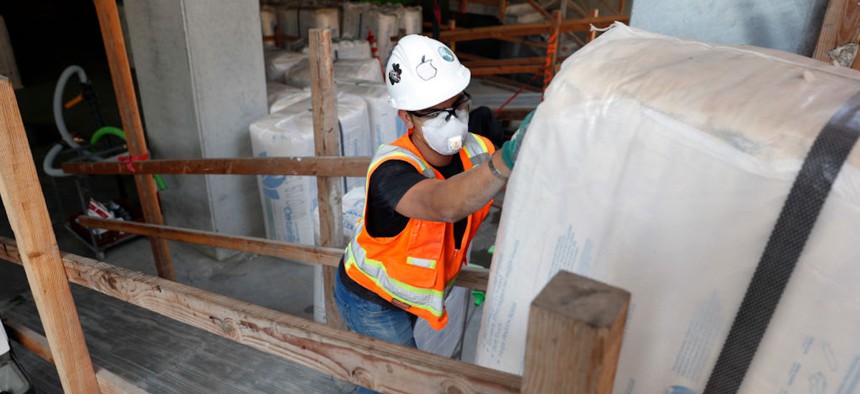How latest building codes can save energy, cut emissions

A construction worker pushes a bale of insulation onto an elevator platform at the construction site of a residential building in Oakland, California, on Wednesday, July 17, 2019. Photo by Carlos Avila Gonzalez/San Francisco Chronicle via Getty Images
Adopting updated energy building codes could help state and local governments improve energy efficiency, boost climate resilience and even save lives.
State and local governments nationwide are considering how to make their communities climate resilient, but many are still applying nearly 10-year-old building energy codes that do not address current and developing climate concerns.
To make businesses and residences more heat- and cold-resilient, the U.S. Energy Department is urging states and cities to adopt the latest building codes. The International Code Council's International Energy Conservation Code, or IECC, is the model for building efficiency standards for property developers and state and local governments.
But most states’ building codes are still based on the IECC’s 2009 edition, despite the latest update in 2021, according to the council’s Vice President of Innovation Ryan Colker. Other states are “somewhere in between, so they’re not capturing energy-efficient benefits,” he said.
The Energy Department released a report earlier this month that assesses the need for states and cities to adopt the latest building standards to beef up climate resilience. Researchers detailed how buildings following updated codes would perform during extreme weather events. For instance, data showed that a single-family home built to 2021 IECC standards could increase its habitability, or how long occupants could survive during extreme weather, by 120% and 140% during extreme cold or heat, respectively. That means residents could stay in their homes for nearly a day longer during a weather crisis, reducing the burden on state and local governments providing emergency shelters and services.
“If the power goes out and folks aren't able to remain in their homes, because they're not built to the latest codes to address extreme heat, that puts pressure on shelters, cooling centers, heating centers, whatever the case may be,” Colker said. “State and local government will need to provide those services, or they may see an increased number of deaths or hospital visits, because the residents are not prepared for those particular events.”
The updated codes call for features such as windows with solar-film or interior shades that can cut the amount of heat that enters a facility, reducing strain on the building’s cooling system and risk of heat-related illness. They also suggest developers install insulation to exterior walls and roofs and improve sealing capabilities to prevent air or water from the outside getting indoors. Measures like that can also put less pressure on a community’s power grid, which could prevent power outages, Colker said.
States and cities must consider how to apply energy codes to a variety of building types, such as assisted living facilities and multifamily homes. “If [the building] is going to be used as a shelter, there are higher levels of requirements that you would see in a typical office building,” Colker said. For instance, policymakers could require a public building to have a generator, so the facility has a greater chance of requiring less fuel and operating for longer if the power goes out.
A separate July 2021 report from the Energy Department found that communities could also benefit financially from updating their energy codes. According to the report, Colorado residents could save $410 million annually on utility bills and statewide emissions could be reduced by 18 million metric tons over the next 30 years with buildings following IECC 2021 standards. The report compared Colorado’s cost and energy savings to what the state experienced under the 2015 IECC.
Despite the sustainability advantages of building energy codes, some state and local governments remain unconvinced. For instance, the North Carolina state legislature last month voted to halt the implementation of building code updates until 2031. Although Gov. Roy Cooper has vetoed the bill, advocates say the code updates would unfairly raise building costs for developers and property owners.
A climate-friendly future may have a high upfront cost, but state and local governments could see long-term energy savings by enforcing the newer building codes. They could lessen damage and save on repair costs in the event of a natural disaster if buildings were constructed to withstand more climate-related damage. The Biden administration’s recently announced $90 million grant program hopes to bring communities closer to long-term climate resilience by offering state and local organizations technical assistance, workforce development and other support to replace outdated energy codes.
Updated energy codes will mean communities can rely less on shelters and prevent death and injury, Colker said. “The expansion of heat and extreme cold events … is actually happening,” he added.
NEXT STORY: Cities paint the way to safer streets






